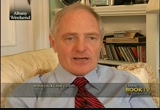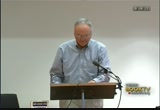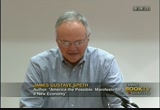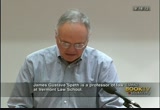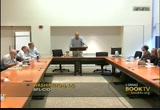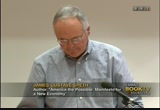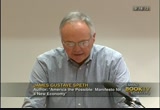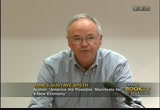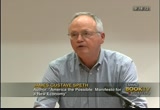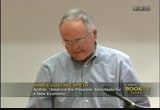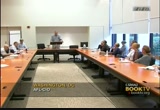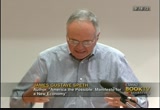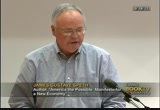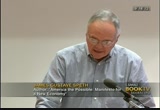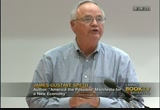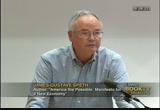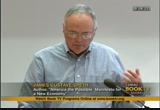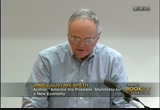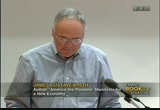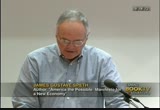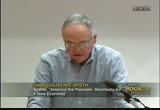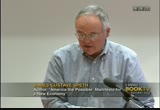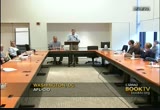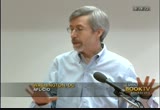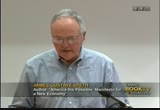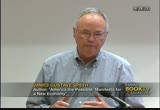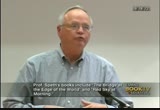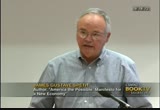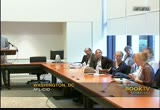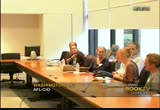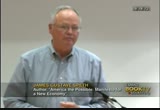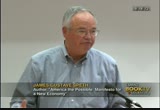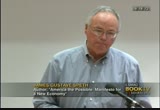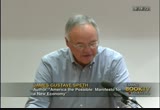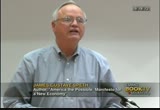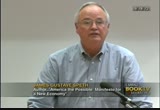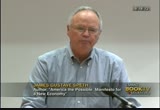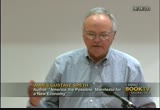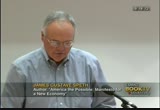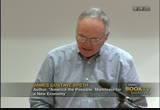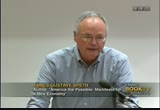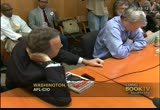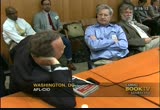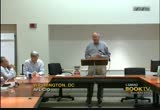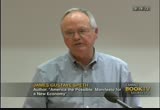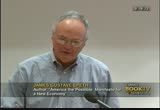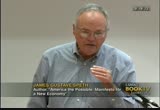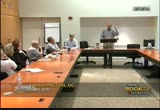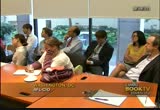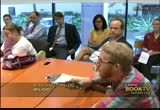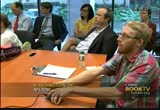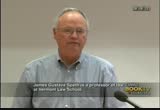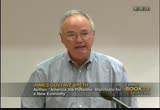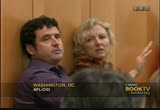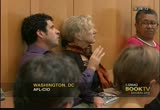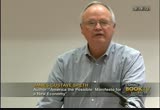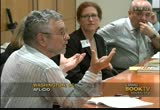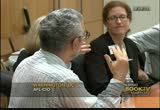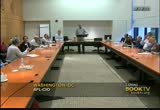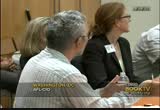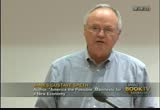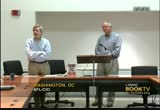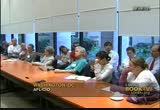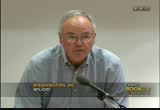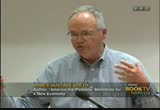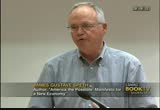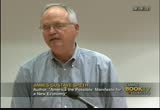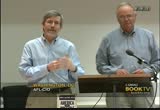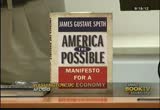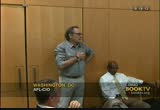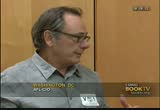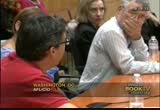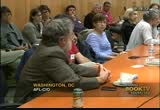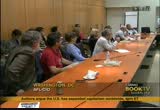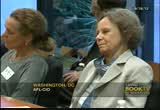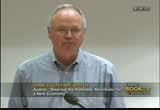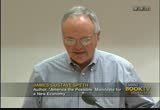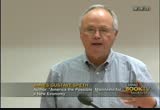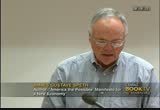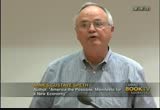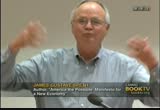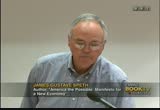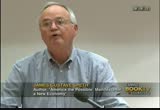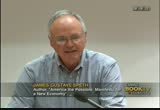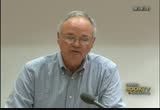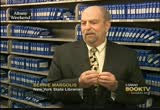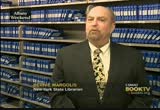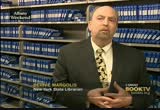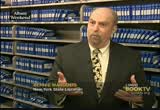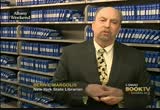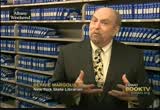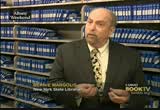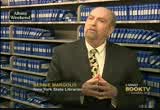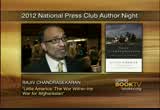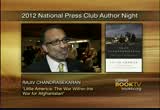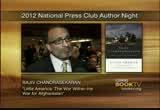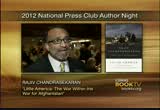tv Book TV CSPAN December 9, 2012 2:00pm-3:45pm EST
2:00 pm
something -- it's a creation, it's an artistic creation, but i would say that other than just the bare facts, as you saw in that book, anything that's written about her necessarily, 300 years later, has to have some degree of fiction to it and some degree of projection of whoever's writing it. so what i've tried to do is show her as much as a man can get into a woman's head or into a woman's heart, to show her going through these areas, struggles and surmounting a lot of these difficulties that she was able to surmount in her life, what it did for her inside and how it brought her to this place that the whole catholic world reveres her and explain that in such a way that it's told as a story is so people will find it an enjoyable experience, an elevating experience to read it and encounter her. and i suppose love her.
2:01 pm
>> for more information on this and other cities on the local content vehicle's tour, go to c-span.org/localcontent. >> now, james gustave speth argues that building a democratic and ec lookically-sustainable economic system will bring about a new wave of prosperity. this program is about an hour, 40. [applause] >> thank you, john, and thank all of you for braving the weather and coming out, and thanks especially to the co-sponsors who joined ips in this and the afl-cio for making in the room available. it's wonderful to see so many people here and so many old friends here. so thank you all very much. i will try to not talk for too long. i have my watch. i didn't have it one time when i was speaking at yale, and i'm delighted to see some of my
2:02 pm
students from yale here, and i ran over real badly, and i apologized for not having my watch and letting things get out of hand, and students said, that east okay, dean speth, there's a calendar on the wall behind you. [laughter] it's good to be here, also, on the first anniversary of occupy wall street, a momentous event. i want to tell you about the book, and i hope it'll interest you enough to -- i'll interest you enough to read it. let me begin with a personal note. i decided to get into this subject thinking about my grandchildren. we have five already and six coming soon, and i began to ask myself, you know, what's the america that we'd like to see for these children when they grow up? what is the america that we're headed towards if we don't correct ourselves? i believe it's still possible to
2:03 pm
build an attractive future in, say, 2050 for today's children, but it won't be easy, and we haven't got much time to do it. so what does that future look like, how do we get there and what do we do now? these are the questions that i address in the book. and i want to talk about four points that correspond to the four parts of the book. the first is the imperative of system change. if we look at the conditions and trends in our country today, we have to admit it's damn distressing. you know, in the book i review a huge load of problems afflicting our country economically, environmentally, socially, politically and conclude that what we have is a bad case of system failure. and, thus, the imperative of system change. when you have encompassing problems spreading across the
2:04 pm
entire national landscape, it can't be for small reasons. it's the system, stupid. and we live and work in this system of political economy. america's operating system, if you will, that's delivering terrible results. i look at the international comparisons, for example, i've looked at the 20 leading democracies, the old oecd, and i looked at 30 key indicators of national well being and global citizenship, and i was startled, frankly, to find that the united states is at the bottom, the very bottom or next to the bottom on all 30 of these indicators of national performance. so it follows that if we want to change the direction the country's headed and build this attractive future for our children and grandchildren, we
2:05 pm
were going to have to change the system. we've got to drive this systemic, transformative change until we have, in effect, the new system of political economy, a new operating system for america, one that delivers good results for human and natural communities, but otherwise we've got to embed new and different priorities at the core of our political economy. and to do that, i think we've first got to understand what are the elements of this operating system that we have today that are driving us into this sea of troubles, the forces that must be changed? well, in general it's the titanic forces unleashed by america's ruthless and rapacious brand of capitalism and by the national security state that we've created that lie
2:06 pm
behindmost of the big challenges -- behind most of the big challenges that our country faces. so in broad terms these, i think, are the root causes. and they perpetuate existing problems, they give rise to new ones on a regular basis, and they keep the problem spigot fully open. so i analyze in the book what are the key elements of today's american capitalism, the key elements of our security apparatus, and i do that in the first part of the book, and i show -- i think -- how these elements interact to produce a system that greatly rewards and, indeed, is based on the pursuit of profit and growth and power and does hitting to encourage concern -- little to encourage concern for the people in this place and planet. i'll turn in a moment to the these key features of today's system and how we need to change them.
2:07 pm
but the point i want to stress now is that, is that what is central to the system change that we need is a move to a new economic paradigm, a new economy that puts unambiguous o priority on people and place and planet. and finally, in part one of the book i conclude that we need a new politics to make it happen. and that we don't have much time. time is the most important variable in the equation of the future, and i think there are four real horsemen in america's decline today that are steadily closing down possibility and pushing us to you are yen si in this area -- to urgency in this area. one is this creeping plutocracy that we see unfolding.
2:08 pm
um, second is the pervasive militarization. third is climate disruption. and fourth is the steady hollowing-out of american society. things that are happening to our citizens. so after stating the challenge, what we're up against, the major part of the book goes on out of in the veil of tears and asks what's the attractive future that's still within our reach, and what have we got to do to realize that future? so that leads me to the second point, second imperative, and that is the imperative of a compelling vision of the future. when systemic change does come, it'll do so because people agitating for change have presented a positive vision of a future worth fighting for. and so for starters, we need a positive vision of what our country could look like in, say, 2050.
2:09 pm
describing that america the possible of 2050 is, of course, tricky business, and i do my best to present such a vision. it needs a lot of work, and i hope there'll be many others turning to this issue. but it starts with catching the united states up with the other industrial democracies, realizing social justice and well being in our country, building peace in real global security and sustaining the planet's environmental assets boast domestically and internationally. and we will have reclaimed our democracy, we will have seen a deep transformation in our dominant values and culture, and it'll be a future more characterized by localization than globalization. well, change also happens not just because people a vision of what things could be like in the country, but they also believe that the means are available to get there. the means are available to
2:10 pm
realize this vision. and that leads me to the third imperative, the imperative of knowing how to move confidently ahead. in the book i describe how systemic change can be pursued by driving an interacting, mutually-reinforcing set of traction formations -- transformations or transitions. these are transformations that would undermine the motivational structure of the current system and replace these old structures with new arrangements needed for a sustaining economy and a successful democracy. in particular i describe in some detail in the book the policy and other means that are needed to move in each of the following directions. in the market from today's near laissez-faire to a powerful market governance in the public interest. from dishonest prices to honest
2:11 pm
ones, from commodification to protection of the commons. in the corporation from shareholder primacy to stakeholder primacy. from one ownership and motivational model to new business models involving alternative forms of ownership and to the democratization of capital. in money and finance from wall street the main street, from money created through bank debt to money created by government. in economic growth from today's growth fetish to postgrowth society from mere gdp growth to growth in human welfare and in democratically-determined priorities. in social conditions from economic insecurity to security for vast inequities to fundamental fairnesses from joblessness to good jobs for all
2:12 pm
who seek them. in indicators from gdp, grossly distorted picture, to accurate measures of social and environmental health and the quality of life. in consumerism from consumerism and influenza to sufficiency and mindful consumption, from more to enough, from owning to sharing. in communities from runaway enterprises and throwaway commitments to vital local -- communities to vital local economies, from social rootlessness to rootedness and social solidarity. in dominant culture and values, from getting to giving, from richer to better, from separate to connected, from apart from nature to part of nature, from near term to long term.
2:13 pm
and in foreign policy in the military, from american exceptionalism to america as normal nation, from hard power to soft, from militarization to real security. if you look at all of these areas, you find that there are a lot of people working in these fields to begin the process of these transformations. unfortunately, they are not always working together, and that leads me to the fourth and final imperative, and that is the imperative of a new democratic reality in our country. so whether we are seeking transformative change or mere reformist incrementalism, two essential steps are linked, i think. and first is implementing as fast as we can -- and i hope it can begin in the wake of this election season -- implementing a series of pro-democracy
2:14 pm
political reforms. and second, to building a unified and powerful progressive movement on the ground. so the final chapters of the book describe what's necessary, i think, in these areas. and they set out an agenda for political reform, and they describe at least some aspects of the movement that must be built. so let me stress two things. our various progressive communities today, in my view, are still -- are too fragmented and to an unfortunate degree in our silos. and if we remain that way, we're not going to be able to take advantage of the positive opportunities that are opening up by the rising disenchantment with the current order and by ongoing crises which will surely recur. so what we need for starters is a unified, progressive identity,
2:15 pm
concerted efforts to institutionalize coordination among all the progressive communities, a common infrastructure capable of formulating clear policy objectives and strategic messages and a commitment to creating a powerful, unified movement beyond isolated campaigns. the second point i want to make in this area is that achieving meaningful changes is definitely going to require a rebirth of marchs, of protest, of demonstrations, of nonviolent civil disobedience. protests, as you know, can dramatize issues. they show the depth of concern, they can attract public and media attention, they can build sympathetic support, and they can put issues on the agenda. and no one who has followed the recent events of the arab spring or the wisconsin statehouse or who lived through the civil rights movement or the anti-war movement of the '60s and the
2:16 pm
'70s can doubt their importance. in short, i think, we're going to have to put it all on the line. so allow me to conclude, if i can, by reading to you a few pages from the book. these are the -- this is a section that address how system change can come to america, and they reflect the theory of change that runs throughout the book. the journey to america the possible begins when enough americans have come to three important conclusions. the first is that something is powerfully wrong with our overall political economy. the operating system in which, on which our country now runs. that system is now routinely generating terrible results and is failing us across a broad front. the second conclusion follows from the first, it's the imperative of system change, of building a new political economy that routinely delivers good results for people in place and
2:17 pm
planet. and the third conclusion is that contrary to what one frequently hears, a better alternative does, indeed, exist. we certainly don't yet understand all the details of how this alternative will look, but we do know enough to have confidence that something better will be built, and we know enough to start building it. these conclusions are not today's conventional wisdom, but more and more people are embracing them. they are the foundations from which the work of system change can move forward, and from the vantage point that they provide, we can see how the dynamics of fundamental change might emerge. as conditions in our country continue to decline across a wide front or fester as they are, ever larger numbers of americans lose faith in the current system and its ability to deliver on the values that it proclaims. the system steadily loses support, leading to a crisis of
2:18 pm
legitimacy. meanwhile, traditional crises in the economy and in the environment grow more numerous and more fearsome. in response, progressives of all stripes coalesce, find their voice and their strength and pioneer the development of a powerful set of new ideas and policy proposals confirming that the path to a better world does, indeed, exist. demonstrations and protests multiply, and a popular movement for pro-democracy reform and transformative change is born. at the local level, people in groups plant the seeds of change through a host of innovative initiatives that provide inspirational models of how things might work in a new political economy devoted to sustaining human and natural communities. and sensing the direction in which things are moving, our wiser and more responsible leaders rise to the occasion, support the growing movement for
2:19 pm
change and frame a compelling story or narrative that makes sense of it all and provides a positive vision of a better america. the movement broadens to become a major national force. we don't know exactly how these or other forces will emerge or interact, but we do know this: that pleas for immediate action, for jobs, for tax justice, for climate action will, at best, be met with proposals for modest accommodation and half measures and that the struggle for deep, systemic change will be met with fierce opposition. so an all-important conclusion emerges. namely, that the prospects for systemic change will depend mightily on our democracy and on the power of the social and political movement that is built. transformative change, and even most of the proposals for reform offered by progressives in
2:20 pm
washington today, will not be possible without a new politics in america. so a pro-democracy political reform and building a new, progressive movement in america must be priority number one. in the end, it all comes down the to the american people and the strong possibility that we still have it in us to use our freedom and our democracy in powerful ways to create something fine; a reborn america for our children and grandchildren. we can realize the new american dream, an america the possible, if enough of us join together in the fight for it. this new dream envisionses an america where the pursuit of happiness is sought not in more getting and spending, but in the growth of human solidarity, in real democracy, in devotion to the public good where the average american is empowered to achieve his or her human
2:21 pm
potential, where the benefits of economic activity are widely and equitably shared and where the environment is sustained by current, for current and future generations and where the virtues of simple living and community self-reliance, good fellowship and respect for nature pre dominate. these traditions may not always prevail today, but they are certainly not dead. they await us and, indeed, they are today awakening across this great land. new ways of living and working and sharing and caring are emerging across america. they beckon us with a new american dream, one rebuilt from the best of the old, drawing on the best of who we are and were and can be. so that concludes the portion from the book. i just want to thank all of you for coming again today. look forward to the discussion and questions and dialogue that we can have in the period that
2:22 pm
remains, and i want to thank also all of the many organizations in their works that i relied on in writing the book including the institute for policy studies in numerous cases. thank you. [applause] >> thank you. [applause] >> okay. we're now open for questions. i do want to note something about the crowd here which it's great to see people continuing to come in, some from fairly far away who have made it through this weather. but it just strikes me that i maybe will start with one question, and then let's just open it up to everyone else. gus said one of the big problems in pushing forward has been divisions or a splintering or different visions of different parts of the progressive movement. and i am struck looking out at this audience that, one, there's certain key leaders of the
2:23 pm
environmental movement. it's wonderful to see john adams who helped build nrdc for many years with gus and lisa who helped build the si yea rah club as well as we're sitting here in the afl-cio, certain members of the labor movement, joe worked in this building for 32 years and has built a group called now the labor network for sustainability. but some would argue that these two big movements, the environmental movement and the labor movement -- probably the two biggest movements in the united states over the past 30 years -- have different visions of the future. so i'm curious how much -- and i'd invite them and others, also, to come in on this, how much you think those two key institutions can embrace, first, your call for system change and whether you have seen spaces where their visions are converging. i thought we'd start with an easy question, gus.
2:24 pm
[laughter] >> well, thanks, john. well, as john and joe know, we are currently working together to launch an initiative that would try to further strengthen the links between the environmental commitment and the labor community. and joe is taking the lead there with his group, and it's very exciting to see this beginning to be conceptualized, not yet launched. it, i think there's a growing realization to answer john's question specifically that, you know, the old economy has been a rather sad place. the old economy has, since 1980, for example, in the u.s. doubled in size. it's twice as big now as the economy was -- well, actually, 125% growth since 1980 in the
2:25 pm
u.s. economy. and during that time jobs have fled our borders, life satisfaction has flatlined, poverty has mounted and inequality have mounted dramatically, environment has declined, the labor movement has lost a lot of members, and i think there's a, you know, a growing realization that, um, this issue of equity and fairnesses in our society is something that we need to bring environment and labor together on in a more vigorous way. if you think about it, one of the oldest -- [inaudible] in environmental performance is to try to get the prices right by internalizing the externalities and eliminating government subsidies. if we really pushed, um, this idea of getting the prices right, prices would go up. and you've got about half the country, half the families in the country who are struggling
2:26 pm
to get by, half the families in the country can't raise $2,000 to meet some emergency need in 30 days, the estimate is. and there are lots of other data that suggest about half the families in the country live on less than twice the poverty line. and with that kind of inequality and the economic insecurity particularly, you know, economic insecurity in our society, you know, it makes it easy the shoot down -- to shoot down environmental proposals and to country cans scared. this issue of social equity and environmental performance go together. and i think the big, you know, the politicians in both parties have framed this election as a big choice. and, indeed, it is, i think. but it is really an even bigger and deeper choice facing the country, and that is do we try to revive the economy, or do we
2:27 pm
insist on transforming the economy, moving from the old economy to, you know, what i describe in the book as the new economy that has different priorities and different policies in all of those sectors that i listed for you. and i'm hopeful that this is, this agenda of building this new economy, of finding new economy jobs is something that can bring labor and environment together, john. >> good. okay. let's open it up for other questions. right here, yes. and, janet, there are, there are microphones around. if you could just pull one of those microphones towards you, it will help us -- and they're already on, so just speak, speak right into that. thank you. and if people could say who they are, too, as they ask a question. >> i'm janet, and i work at the institute for policy -- [inaudible]
2:28 pm
i just wanted to say thank you, gus, for the visions you're laying out in this book, and i think what's really exciting is -- [inaudible] what they don't like, but what -- [inaudible] i just feel like that's been part of it over the past four years, so i think it's really exciting that, you know -- [inaudible] >> let's just say that i think the institute for policy studies has been one of those groups that has, you know, reached out to make a bridging among a lot of different communities. that's how i found john. little did i know that he was brother of ralph who works for the natural resources defense council. >> [inaudible] [laughter] one of the questions i have is -- [inaudible] in the work that i'm doing on climate and environmental justice work is how do you move
2:29 pm
from the vision, which is really exciting, think -- [inaudible] just how in thinking about some of the, some of the -- [inaudible] you talked about specifically meeting an infrastructure and some particular types of strategies, and -- [inaudible] space carved out, but there was a real question of what do we do in that space. but kind of more specifically, i'm wondering, um, how do we address, um, the issue of corporate power which you talked about as one of the problems corporate -- [inaudible] militarization, etc., how we address that in particular when we're thinking about bringing this multitude of movements together, and within that multitude -- environment, labor, etc. -- there are, there's a range of --
2:30 pm
[inaudible] so i'm kind of struggling with this idea of having a multitude of -- [inaudible] but also having a way to really take on that power in a way that -- [inaudible] and i wonder if you can talk about that a little bit more. >> okay. i think one thing to comment on occupy and the aftermath now that we're one year down the road, i think it had a profound effect. my impression without being really intimate to the whole process is that, you know, that it's spread around under a lot of different contexts now, foreclosures and other housing issues and on and on. and so far from being dead, it kind of disappeared from a lot of the news, but i think it had a profound effect. i remember writing the book a few years ago and really having to dig around for data on inequality and poverty, and they put those issues front and
2:31 pm
center in the national dialogue here. and i think it's contributed a lot. but one thing it hasn't done is what the tea party did. and i don't think they're particularly interested in that. i think they were more particularly interested in getting people's heads in a different place but the tea party moved from protest to power in short order, and i think we need both types of movements in effect in our country. one that's trying to teach big lessons about the failure of the system and what we need to do to change it and the other to begin the process of actually moving from protests to movement to power on the progressive side. you know, you asked about the corporate sector. i think there's -- to me, you know, there are two big things
2:32 pm
that we can do and should do now. one is in the wake of this election and all of the money slushing around, bring everybody who's concerned about this creeping plutocracy in our country together and push -- and i think that should be a big group in the wake of what we're beginning to see -- going to see between now and november and come together in a mighty force to try to implement a series of pro-democracy political reforms. ..
2:33 pm
matching, high ratio as proposed by senator durbin and others. but, in general, you know, we have got to move toward the separation of corporation and state. begin to read this influence of big money and corporations out of the atoll process. but, remember, operations spend a vastly more on lobbying than they do on elections. and so the whole process of lobbying reform, adding transparency, revolving doors and all the things that, you know, have been played out that our wrong with the current
2:34 pm
system, we need to -- that needs to be part of our agenda after the election as well. so i said there were two big things. i think that is one, to come together. i could go into more detail if you would like on my top-10 reforms politically. but the other big thing, i think, we need to do now is to begin to bring the future into the present. there are so many exciting things going on around the country, particularly at the local level that are models of what we want to build for the future. you know, a lot of community revitalization efforts. they tend to be, of this tends to be in two kinds of places. one is places that have been bombed out, in effect, by ruthless neglect. and you know many places like that. and so things spring up like the evergreen cooperative.
2:35 pm
what's going on in detroit and other things. but the other place where a lot of progress is being made, the university towns and places of that type. the things the federal government can do to provide support and the agendas being developed to support these initiatives, and there are lots of new types of corporations being created a new loss for the corporation that take the pressure off of the company to form simply for the shareholders . and allow it to do other things. lots of social enterprises. large -- the new book on the new corporations is very helpful, i think, and defining a series of different types of companies who , cheryl their own companies, co-ops of various types, mission control companies where the
2:36 pm
mission and direction of the company is given over to a small group of super voting shares which are closely held and guarded overtime to, you know, social process used in a public-private hybrid and for profit, not for profit hybrids. so this is an area where we can hope to bring the future and to the present at the local level. i think there is, you know, basically a movement that is needed for the corporate sector. one is a series of efforts that would raise in the big companies and the other, which i could give you a list, i can give you my favorite list of things. in this field, the other is to build this, the new corporation from the ground up, as i was
2:37 pm
just describing. but, you know, we need to get serious about internalizing the externalities', one study of a thousand major international companies showed that just internalizing, just paying for their environmental externalities', bang for their environmental costs that they aren't paying for now would wipe out one-third of corporate profit. there are other text analysis. that was an amendment. we need new requirements. they could be implemented through national charter system. i think one, you know, it is so silly to be chartering giant international companies that the state level. i'm thinking that, you know, there was -- i mentioned in the but there was a group that,
2:38 pm
opposed to charter. the company said its and it -- said its mission was to kill several hundred thousand americans a year with the use of tobacco products. that was its corporate objective. its sale through the virginia corporation secretary of state or whoever does it there. but this is -- you could use the federal charter. you could have federal charter and the corporations. many proposals and are passed to have this, to incorporate a lot of things, including periodic reviews of corporate performance and hearings. we should tell the feel back toward labor in the right to organize and bargain. the incentives that could be put in place to discourage this short term is a and exist on long term, you know, thinking and performance in companies. you could applaud the public utilities model to the
2:39 pm
regulation of the larger group of companies, not just electric utilities. one not? have public hearings on big investment proposals. this is part of this democratization of capital. and we could reverse the, modification and began to really protect the comments. we could require shareholder approval of political actions by companies. and on and on. there is a lot we can do, but some many of the things that i think we need to do in that think that a lot of you believe we need to do require a strong, effective democratic, you know, successful government, competent government. and until we start coming together to really reverse this deterioration of our democracy and our governments, we are not calling to have the kind of government we are willing to
2:40 pm
entrust with the big things that need to be done. it's you know, i was thinking about it. i came to the conclusion that there was something ironic the true about reagan's famous statement, you know, where he said government is not the solution to our problems, government is the problem. and in many ways, we have had a government that is the problem. and so we need ted, i think, just this idea of investing first and foremost in our national political life is the highest priority. >> in the back. what do we take to three questions. >> sort of a call-up microphone.
2:41 pm
>> straight talk. and i love the vision that you're painting. and i'm struck by the size and the task. if i understand your conclusion correctly it is that if we are going to achieve the goals that we share we're going to have to take the power away from the people in institutions that have the power today rather than trying to persuade them or regulate them to use that power more responsibly. and that seems like a correct diagnosis to me. but i am interested in your assessment of the probability of being able to accomplish that in a democracy and where we are today given where we are with
2:42 pm
citizens united and, you know, there are two things that i am interested in your thoughts about. one is the comparative appeal of an honest message, you know, i think most progressives are laboring under the disadvantage of wanting to speak the truth. rather than the approach of speaking what works. and the other side is quite effective because it uses psychology to figure out a message that works. so that is one question, whether the message of truth can be as appealing. the other one is the size of the megaphone. he talked a little bit about some ideas, how to reduce the
2:43 pm
ability of the people that you try to take power away from to use their huge financial megaphone to plant all of the seeds of doubt and anxiety and fear. so those are my two questions. >> just another big one. >> well, i stress in the book, david, that i think we have to walk on two legs. i mean, there is, as a community, has a large community . there are groups and people that can specialize in doing the approach, finding, you know, the points where action is possible. i hope in that context that people will think about, you know, what has been called the non reformist reforms. reforms that planned the seed for deeper change to evolve from them. and i think one of those is new
2:44 pm
indicators. i think if we actually had a genuine progress indicator, as john here has worked on and others, they could go toe to toe every quarter with gdp and monetize major sustainable economic welfare. you know, we would see whether that reporter growth was really helping anybody else. and i think that is kind of a non reformist reform, to move to a new indicator systems to dethrone gdp in the process. -- and so i think we have to walk on the reformist leg. clearly, as i say in the book, we have to begin serious profound action on the climate issue before we get the big changes in our economy. there is just no time left.
2:45 pm
and i think most people, you know, and our political leaders in this town don't have a clue how serious decline in issue is and how near we are still losing something precious and long-term . the -- so, i think that there is a two-pronged approach, and the question on probability, what is the probability of what i say is possible? i still think that we can build an interactive future for our grandchildren, but i don't think we have a lot of time to get started on command i think i'm going to ask you tell me judge the odds. i think it's tricky. i mean, it's certainly not a sure thing by any bet. and it probably, you know, less than 50-50 that we are going to rise to the moment here and do what needs to be done. best yourself these questions. these are the reasons for hope,
2:46 pm
i think. and as yourself, you know, the causes of the change. so ask yourself, how far along are we in each of these areas? where all are we in the movement for promoting systemic change? how many people, for starters, are fed up and seeing the system at the bottom, not just fed up, but seeing that there is something systemically wrong. secondly, to we have the capability in place to take advantage and to have learning come out of the crises that are undoubtedly going to a record? thirdly, of the progressive communities really coming together? the progressive fusion, if you will, that i talk to the initially. do we have a vision of where we want to go for 2050?
2:47 pm
and do we have things going on at the local level that really bring that vision into the present, ground up, so the speak. do we have a new story? america needs a different story. let me say what -- let me say what i think up front. the leaders and thinkers and activists who honestly tell the story and speak passionately to the moral and religious values it puts into place will be the first political and generations as the new deal. >> how close are we to having a new story? >> the focus on pro-democracy political reforms and building a movement. how far along are we in framing
2:48 pm
a coherent agreed upon agenda for political reform in the wake of the selection and then working together to build a grass-roots movement? and leslie, are we protesting enough? are we -- are we -- have we learned that lesson enough? to we have enough going on? i was happy to a -- so please to have a chance to participate in the tar sands action, and i think that, you know, it -- we did something there. we wanted the beast. we have not kill the gatt. but they're needs to be, i think, a lot more. so you ask yourself, you know, i take hope from the fact that on each of these theories that i take off, you know, the drivers that will change, that things
2:49 pm
are moving, there's something going on. it may not be far along in some areas, but in others it is far along like the local initiatives. so that would be my answer, david. >> well, starting. whoa. >> nbc. i work with public solution. and my question deals with what you were just sank. we have seen quite a deliberation. the indicators and abroad, you know, currently all looking at officially at the federal level we can do to replace. and at the state level, our dpi as well. something like gdp. we haven't seen as much of the federal level here.
2:50 pm
a policymakers. and so i guess my question is more than how question. how do we move forward and potentially have a veritable alternative gdp. is it more -- more needed at the grassroots level to try to drum up support? at their level. >> you know what. [indiscernible] >> the creators of a genuine progress. did you want to say something about this? [inaudible] >> let's take one more from the sub. >> i was wondering if you have thoughts or ideas are advice that you would give.
2:51 pm
some of the occupy folks. the architect. and it creates the occupy in sight. the individuals and safety. but now they're creating this coalition. and one thing called occupy the vote. [inaudible] >> anything that you would really love to make known? >> i think we need a movement. part of the political reform agenda, number one, it seems to me, would be sort of the voter registration is most a vast. you get to be 18, you automatically are registered. and it ought to be the default position, and you know, i think
2:52 pm
if we are going to have a constitutional amendment, it might also at that the citizens have a right to vote. it's really not guaranteed in the constitution and the way that it should be. and so those are some thoughts. on the indicators issue, i have been -- by lost touch with one initiative that i thought was very helpful here in washington in the obamacare legislation, the national indicators thing in the back was the past. it was authorized. $70 million to try and create a better understanding of indicators of well-being in the country and that it was basically going to support this state of the u.s. a group to do that. and then i'm not sure what happened, but i don't think they
2:53 pm
ever get the money, did it? >> never appropriate. >> its still sitting there. it could be appropriated. i think they have done, in my judgment, some very sophisticated work. perot knows more about how to approve the gps ford and anybody and i think we need certainly this effort to surround the country with actions that the state level. these laboratories, democracy at their backs and i think we need a dashboard where real looking not only at this sort of alternative to gdp type measure, but we have a measure of democratic performance. we have an indicator of social conditions in the country, an indicator of environmental conditions. and we are able to look at all these things on my regular basis .
2:54 pm
2:55 pm
looking at the system as a whole. [inaudible] [inaudible] we are dealing with international financial authority. >> in all honesty that's another book. i do, and the book, and i didn't stress it here, i do have some rather lengthy discussions about u.s. military and foreign policy and the need for deep changes in these areas as part of any change. and i talk about those issues.
2:56 pm
but the best estimates that we have are that there could be a dozen u.s. military bases around the oral. the federal government, the security portion of the discretionary spending in the federal government is now up to two-thirds of all discretionary spending, security in the broad sense of intelligence and common security as well as defense. john's group on what's going on, but our, you know, our military spending is 23 percent of the global total. and so this is just -- and meanwhile there is a long list of international challenges, including unconventional security challenges that we are neglecting. and so we tried to describe that and talk about the need to, you know, figure out how to mind
2:57 pm
these international issues with the domestic ones. >> three more again. right here. >> i have been. [indiscernible] >> i think this is our really exciting mission. at think this is really exciting. and come from in the 60's and think it's more important to think about the process and is important to realize. arafat had to be done in process , it has to be done in a
2:58 pm
problematic way for a long time. it seems to me, worked in the coalition's. the findings. and. [inaudible] i think that putting together a progressive -- putting together all progressive people is not going to happen right away. that doesn't mean we shouldn't try do it. the other side is going to push. [inaudible]
2:59 pm
super radical or not radical or whenever. people want to stop change. just normal, independently normal -- different people's perspectives, right, including the progressive movement. there are some ways that we need to proceed toward that goal, realizing we're not there yet, realizing this not happened yet. [inaudible] the civil rights movement. one of the things she found was at one point civil rights organizations that have a five person said then. the international forum. as things are happening all the time.
3:00 pm
but what they used to do to win. and so they start with these things that used to be victories . really important as we move forward. you don't let -- that we figure out a way to say, yes, we're winning unless. and the. [indiscernible] it is a victory living in the right direction so that we -- we have a lot of frustration. we need to figure out. >> cleaning this up a bit, political reform. there is a pattern, i don't want to exaggerate too much, but a little bit. the pattern is that after some political debacle or policy like in the 2000 election people come
3:01 pm
together and get something done, but it is not the priority of the progressives. a fairly short order, the political reform agenda, the process agenda, you know, drops into the background. people go about issues like justice for jobs. so i think that this sense of the long term is absolutely right. it took decades. toward the end of the book i list one after the other, the big challenges that the country has to deal with. and in health, education, on and on and on. about 25 things. it's shocking really. ..
3:02 pm
3:03 pm
[inaudible] [inaudible] >> this is a similar question from a more pointed direction. you now, i think one of the things the labor movement notices is that it's possible to characterize what's gone on in terms of the living standards, working people in america as great promise of the last generation. if you twist your data a certain way. a lot of our people afford a lot
3:04 pm
larger tv than in 1970. people don't steal tvs as much as they used to because they're so cheap now. [inaudible] last night are not made in america anymore like they used to be. but in actuality, the things most important is which your book is about trying to capture. the most important in people's lives in terms of family retirement security, health care, access to education have all become much more difficult for working people to obtain. and the quality of life -- the quality of life is great pressure and has been for a long
3:05 pm
time. now, it can be very challenging to have an argument about this larger politics coalition. i want to be very pointed about one aspect, which i find very challenging. the afl-cio is always on record expressing the highest level of concern about climate change. president trumka gave a speech -- >> imposing a 50% marginal tax rate on income over 250,000. these are hard to us, but to me solving the equity issue that damon talks about his fundamental to environmental success and affects environmental outcomes and therefore is an environmental issue. i did talk a little about this
3:06 pm
earlier. john, yes -- i think that, you know, historically is changing now. but my impression is the main environmental groups in that century have had a lot more comfortable framing proposals that resonated in this town that may have been in framing proposals that resume with people that i miss messaging capability, disability to talk and reach out to different constituencies at the local level is very important. we are enormously successful looking back on it in the 70s
3:07 pm
by doing the things, lobbying and raising public awareness in litigating and work in this town. but over time, those skills needed to be complemented with a much more sustained and larger investments in building capacity at the grassroots. and really working with other types of community organizers to bring environment issues into that organizing of her and framing messages that really resonated with what people care about in their lives. so i think there's a lot we can
3:08 pm
do to build a greater support at the grassroots level. certainly i would love to see the environmental movement get more engaged in the electoral politics and think of the imbalance between involvement and lobbying in litigating and public education versus getting people elected and all the things that have to go into that. a tea party shows one thing, it's that it's possible to do that. if you build up enough momentum and enough concern. so that would be my answer. >> we have time for when the amount of questions here. i do want to say for people watching the session on television that these ideas that
3:09 pm
speth is putting out, "america the possible," which i think everyone in this room highly recommend. what you say 30 seconds point relates to what john adams was saying before the final run of question, which is 50 inc. a lot of us in this earnhardt span decades fighting for social justice and for good jobs and we have certain date trees we can point to, but we are not winning right now. we spent our lives fighting for sustainability and climate change and we have some important it areas. overall we are not winning. so could you imagine the premise of the book, the premise is could you imagine these movements coming together and sharing a vision, something like what guys have put forward,
3:10 pm
sharing the joint project enjoying their forces for both social justice and jobs agenda and sustainability and climate agenda. imagine what we could win. that's the premise of the conversation. there's enough people from different of these groups that know how to talk with each other and making sure the station. i haven't heard anyone countering divisions that you could imagine this sort of coming together. i don't think it happens overnight in some of the discussions of how long it takes for people to come together around a shared vision. many of us are concluding it's the only way forward. now those of you who still want to say some thing will say it in a shorter pharmacy can. set the very end of the table.
3:11 pm
>> i worked with us for 40 years and also the nrdc for 40 years. my question is a simple one. do you see anything out domestic in the present election cycle? >> the gentleman standing up. >> to pick up -- tom rausch at the nrdc. rio last june had 50,000 people people -- 50,000 excited working together. there is a presence which was totally useless. so there is a grassroots. as aggressors in this country.
3:12 pm
this in butler county, southwest pennsylvania simulate upset people that are getting cancers and light the water on fire and so forth. the grassroots can not be given enough emphasis. i wonder what she'd think about that because it feels that a solution of sorts, and energy and force that needs to be exploited. for example, communication. one of the things that i listened people communicating all over the globe and somehow that's going to continue. >> gentleman in the red shirt. i [inaudible]
3:13 pm
3:14 pm
other countries. so the question becomes, how on this global environment would be state capitalism vigorously against each other for resources and for market and cheap labor. how does one bring standards within that timeframe we talked about to the breaks. china is really behaving internationally no different than the united states, great britain behave in prior centuries. as you say, we are running out of time and running out of resources. the kind of renewal, political renewal were talking about really has to be global in order for this to work because the u.s. based corporations doesn't
3:15 pm
fall on the global economy. so i'm imagining, is this overthrowing the wto and allowing the environmental sky rise are things that produce products for national legislation, winding operations operations -- what is a delicate a handle on that? [inaudible] >> i have so many peered to her three years ago paul kildee wrote a book, arguing that exactly the kind of results in terms of movement will not happen in this country until you have a much bigger crisis, such as 2008 resource shortages,
3:16 pm
crises of terrible materials, which delegitimize his system and brings those forces. to make it happen, things need to break down more as it exists. that is one scenario, yet optimistic on the other side. >> okay, if you could answer all of those and then give us our marching orders going forward, we would appreciate that. >> well, this election is enormously important and i think that what is their position in an earlier election didn't matter between the parties. you know, it's very wrong about
3:17 pm
the current situation in which we find ourselves in the election. so in that sense, i think that you have to hope for a good outcome in this election. i think there's a huge difference between the candidates. that said, as i mentioned earlier, i now see any real embrace of the questions facing countries and i'm extremely -- despite ringing the climate issue into his acceptance speech, i think the treatment of the climate issues is still irresponsible on both sides right now.
3:18 pm
and the abominate energy policy is not at all what we thought to be pursuing to deal with this climate issue. one day, september 7, just an average old day in reading the news about climate, experts unsure about causes of record-breaking west nile out week. but some suggest extreme weather rapidly melting south african glaciers contribute to sea level rise. destroyed coastal ecosystems emit massive amounts of carbon. caribbean corals declined sharply from rising temperatures. that's one day, every day. it's in the literature.
3:19 pm
not in our campaign. what kind of a mandate -- what president obama when he deals with the seriousness it requires. i do think the that our movement has got to be done in parallel, in tandem with international developments, international movements. you know, we've seen what happened at copenhagen in the time of justice coming together from all over the world. we see what cannot seen what can have been and paul hoch and read a book, blessed unrest in which he just lists goes on about all the different protests, injustice, and sustainable
3:20 pm
develop movements around the world. and it's extraordinary. we ought to be part of that and learning from it. in part because so many of the problems we have to deal with our international problems with cooperation. the institute went to rio with a proposal that called a widening circle to try to bring more coherence and cohesion in this international movement. i wish them while with that. consumerism is very different than consumption. consumers then associate that more staff is going to bring more meaning and real happiness into our lives beyond meeting i reeled and it is a disease that
3:21 pm
we have a bad case says. i guess it was my friend, john took rather pointed to this phrase of that disease. there's a lot we can do. if you look at elizabeth cohen spoke on the consumer republic, you finding great links the way we returned into consumers and the way that the political process built up this mass-market consumerism in our country. i suggest very strongly that we can find you some of that, maybe a lot of it and hopefully we will. if we had the price is right and imposed stiff border tariffs on countries that aren't getting their price is right, that would be very helpful. we need a progressive consumption tax.
3:22 pm
if we had a high-quality public services across the friend, that would dampen consumerism. if we greater social equity at the time a lot of for grasping in our country is to try to get ahead of the joneses. it's been shown over and over and over again. if we had greater equity, everybody standing in the stadium so you have to stand up, to be moderated. there's a lot we could do for social marketing and education campaign. we could impose extended producer responsibility on all products and have to take it back from automobiles to everything else. we clamp down on to easy credit
3:23 pm
and predatory lending. ban advertising to children i think of lemonade to do that ability of advertising expenses. move to a shorter workweek. we work maybe 300 hours a year, you know, longer in this country than europe. if we could actually get productivity gains to be reflect and wager he, we could take a lot of that productivity gains to do the things that really matter to artists. families and friends and hobbies, learning and other things. so there is an agenda that we
3:24 pm
could pursue to address this consumerism. in an earlier book, red sky morning, i advocated strong international environmental regulations to do with this curvaceous ms. much is your part to move to what is union wide environmental controls because it's moving across borders and the world really has to go to international standards to an answer to we have to develop the effective environmental controls at the international level that i needed to deal with these issues and provide a common
3:25 pm
theme for countries out there operating internationally. but she remembered the 300 largest corporations, 100 are still the best companies. so we are the center of the corporate world. glass lay on book that she mention, i don't think i'm quite as pessimistic if that's the right word. that things are much too bad for pessimism. [laughter] but it might come to this an area he described. i guess in some ways depiction and plea in my book is we could do better.
3:26 pm
we could be better people and we think we are sometimes and there's still a realistic possibility that we can rise to do the things they need to be done to move not only to deal with the current issues that we have now, but as steve hawkins said earlier, to challenge the system of power that is now controlling things and has to be changed if were going to be a chart two, livable for future generations. thank you area match. [applause] >> bar from albany, new york with a time help of time warner
3:27 pm
cable we talk with her libraries. >> the new york state library goes back to 1818, one of the first eight libraries in the nation at the very, very proud among tradition of being able to share resources with everyone. certainly the grilled libraries for me one of the cornerstones, sort of the diamond at the top in terms of saying the commitment new york makes his people is a commitment to everyone. if you take a moment to think about not being able to open that book and read at without some other kind of intervention, you get the idea this is a pretty amazing service that the government has created and we
3:28 pm
been able to offer in new york for decades and decades. >> this is the free service that is offered through the national library service for the blind in the library of commerce to citizens in all 50 states. the focus is to provide the chance for people to read who are in some way print disabled, people who can't hold a normal book. they may be blind, they may have other handicaps or disabilities that prevent them from opening a book and using invoke as if intended. so we circulate about 850,000 different items, represents a huge, vast array of fiction, popular fiction, nonfiction, quotation books, the holy bible, you name it. most of those are either.
3:29 pm
the movement now is for additional books are for people to download from their computer or home device, a full book or magazine for them to use at home. we serve individuals about 15,000 people regularly part of the clientele and research people through 3000 institutions. nursing homes, day care centers, where people in the community gathers shumate. this may be talking books or books in braille, but also where we get people connected to her service. the network were part of has at least one talking book and the
3:30 pm
design obviously is to be sure everywhere this idea of equitable access, equal access to materials is fulfilled. in new york, the braille library is your local library and you can go to any public library. even academic libraries in new york. if you're in some way print disabled and need help listening to print materials, this libraries make a connection to us and we make arrangements for people to have improved access. it is a significant transition from books that used to be recorded pretty much on tape. the whole cassette tape idea to using the in digital technology and were very excited about the
3:31 pm
transition because it makes it faster, cheaper, more efficient to get it good reading material when they need it. the service is designed for the government to be sure that people have equitable access to these material in the spirit of public libraries in this country. we have over 15,000 libraries. with more public libraries than donald. we had a chance of a service like this to be sure everyone has a chance to be well-informed citizen come which obviously is most critical, but also to enjoy the rewards of being able to read great novels and great literature and be part of the world around us. we call ourselves the talking book and braille library. we could probably call ourselves a talking book library in part because braille is not as popular as it used to be.
3:32 pm
braille is expensive to produce, it uses a lot of paper. it is a paper-based technology. new addition just came out in the past couple weeks. pretty amazing and pretty important reference tool. in braille, 107 volume, 107 volumes. i don't know how many, 20, 30 shelves filled with the volumes of what most people know is when pretty chunky volume and in digital form a little step about that big. the economy around grail is pushing a lot of people to think about all those other forms, digital forms now available and while many people still speak
3:33 pm
braille, use braille, create braille, junta printers than the punches better part of the braille language, we see many younger readers not use braille, but rather he's obviously all the other audio and connective forms that there are in terms of communication. so many handheld devices, many of them have speaking capabilities and audio capabilities now. i'm not going to make any predictions about braille, but we are seeing less and less of it. it's interesting as we talk about the transition of braille to other forms, one of our challenges is free of many transitions in the world of talking books. the transition from braille to all the other forms, the
3:34 pm
transition from the old cassette tapes, which is a technology that the national library service full text completely at the beginning of next year. they won't be producing anything in those state forms. that will be gone. in most people's personal lives, the cassette tape has been gone for a few years. so what little bit behind the curve there. the movement then comes in several different forms, but generally a little magic stick and i'm guessing that would be changing soon as well just because the targeting smaller. more compartmentalized, cheaper to produce and faster to produce. we want to be sure people who are print disabled will get
3:35 pm
their books right then and there. we don't want people to have to wait. so we are transitioning along with the national library service for the blind in all the areas. you see behind me additional materials, but if you look around can you see a lot of cases and green. that will be obsolete. our challenge at the federal level, the challenge is how many of these older materials do we need to reconfigure into new formats that they will be available for people and how long can we afford to operate in several different modes, sometimes particularly older people find themselves once they learn a particular technology
3:36 pm
and machinery, they want to stick with it because they understand it. so we try to be sensitive to individual needs. but at the same time, our goal is to get as much material available to as many people as quickly as we possibly can. the structure of the talking book library is in the service of the blind is a structure based on federal statute that permits the national library service, part of the library of commerce to stickier copyright support, to enable them to create talking books are books that would otherwise be sold this audio book. so the federal government has devised an arrangement that is part of the world so people who
3:37 pm
create works, whether printed form or audio form retain world of copyright. but basically the same fees a relationship enabled the government to invest additional resources to convert those books into talking books available to the talking book and braille library. in some cases, not always it is the same book and may even be the same narration that is used. in many, many cases, the books part of the talking book and braille vibrate are not available in the marketplace as audio books. even though a lot of material for popular things, bestsellers, "new york times," there sometimes is a lag in terms of availability because the
3:38 pm
marketplace dictates the paying customers are out there first and those are the audio books you might buy online are from your favorite bookseller. talking books, if you were to listen to any of the ones we have, they're extremely professional. the periodicals people can get as part of the talking book and braille library, also the narrators are skilled, even though many may be volunteers. they are very skilled narrators. if you have any audio book, you would be very attractive to those materials. but the audience is limited and obviously most people would understand that these are widely available and they were available for free the people who have created them would not
3:39 pm
get the appropriate return on their creative energy. so we are very respectful and very thoughtful to be sure people qualify for the service. we go to great lengths -- >> upm parses quirky humor, illuminating the subtle truths that work in our lives. >> it is one of those remarkable services that the government has designed and funded in order to do it our democracy needs to do and that is be sure that it can everyone has had access to be well-informed citizens and fully participate in all the things that our democracy has to offer. >> "washington post"
3:40 pm
correspondent, rajiv chandrasekaran. his newest book, "little america: the war within the war for afghanistan." mr. rajiv chandrasekaran, what are you talking about quite >> the americans built in southern afghanistan. six decades ago. back when unknown to most countrymen were dozens and dozens of engineers here. 40s and 50s digging irrigation canals, building dams, hoping to nation build in afghanistan and the very same terrain president obama's troops unfolded in the last couple years. in my history book on the search and examination i start back in the 1940s in his remarkable. of american assistance to afghanistan, a period of up to my son when we built this town they are at the afghans called little america complete with coed high school was spent
3:41 pm
together come a clubhouse we could get a chin in tonic. it was a period of great promise for americans in afghanistan's. i use it as the opening for the book that talks about the great hope and tragedy of our war in afghanistan today. >> does little america still exists? >> it does. it's the capital of helmand promise. the suburban style homes come away stucco walls have now been told over. there's no more swimming pool and it's not quite as safe as they please as it was six ago unfortunately. >> now, for americans, six decades as a long time. for the afghan community come it's not such a law. period >> afghans to remember this period. i remember traveling through helmand province in 2009 an old afghan man came up and asked me a marine colonel is with whether
3:42 pm
he knew mr. and mrs. learn all. of course the learners are the couple's had taught him english back there decades ago. he had no concept united states as a country 3,300,000,000 people. of course we americans should know every other american. why did we not do the people who are taught in english? for the afghans, they remember with great fondness american engagement and remember far more fondly than the current american. of our stabilization activities unfortunately. >> rajiv chandrasekaran, haven't there been several starts and stops, hopeful. in our history with afghanistan? >> there have. the 50s and 60s were a period of great optimism and obviously the soviet invasion after the taliban were toppled
3:43 pm
after the 9/11 attacks as a period of great optimism that afghanistan would be able to build a more stable democratic society. but the mature cry off the ball and focus on iraq and what that allowed mr. taliban to surge back and. what we see now is a mixed bag if you will. there has been good games paid for by the lives and limbs of american servicemembers and we've beaten back the taliban and places. has improved. the real question as to whether that can be sustained, whether its army and police force will take the baton from american forces as they come home the next couple years. >> rajiv chandrasekaran anti-imperial life of the city was about that bad, "little america" is about afghanistan.
146 Views
IN COLLECTIONS
CSPAN2 Television Archive
Television Archive  Television Archive News Search Service
Television Archive News Search Service 
Uploaded by TV Archive on

 Live Music Archive
Live Music Archive Librivox Free Audio
Librivox Free Audio Metropolitan Museum
Metropolitan Museum Cleveland Museum of Art
Cleveland Museum of Art Internet Arcade
Internet Arcade Console Living Room
Console Living Room Books to Borrow
Books to Borrow Open Library
Open Library TV News
TV News Understanding 9/11
Understanding 9/11